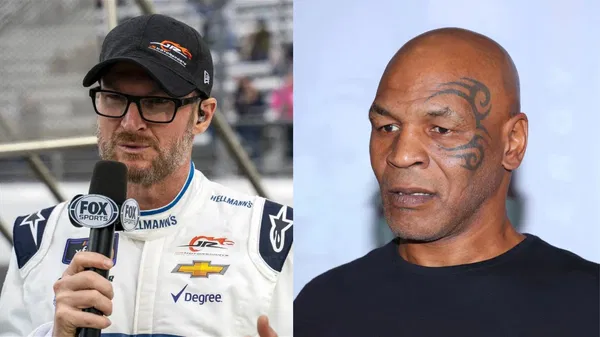The recent boxing match between Mike Tyson and Jake Paul has stirred debate among fans and commentators, with some labeling it a spectacle designed purely to generate revenue. This sentiment was captured succinctly by a fan who remarked that the fight seemed like “two guys who didn’t want to get hit because they already had their paychecks.” NASCAR veteran Dale Earnhardt Jr. shared a similar perspective, aligning with the belief that the event was more about entertainment and nostalgia than genuine competition.

Mike Tyson, now 58, retired from professional boxing nearly two decades ago after a storied career that included 50 wins. However, his final professional fight in 2005 against Kevin McBride saw him quit before the seventh round. Tyson’s return to the ring against Jake Paul was not about reclaiming glory but appeared to cater to fans’ nostalgia and the younger audience’s curiosity about the legend.
Tyson’s Health and Performance
In recent years, Tyson’s health has faced challenges. Just six months prior to the fight, he suffered a severe ulcer flare-up that caused significant weight loss and left him visibly weakened. These health issues likely impacted his performance, with Tyson landing only 18 punches across eight rounds, compared to Paul’s 78. The judges unanimously awarded the fight to Paul, with scores of 80-72, 79-73, and 79-73.
Tyson’s lackluster performance suggested he was not aiming to win but rather to put on a show for the fans. Dale Earnhardt Jr. echoed this view on his podcast, comparing the fight to a pre-arranged match race, where the outcome was more about entertainment than competition. He recalled hypothetical scenarios involving his father, Dale Earnhardt Sr., emphasizing how such events might be structured to “look good” for the audience.
The Commercial Side of the Fight
The fight, streamed live on Netflix, achieved massive viewership and generated significant revenue. Tyson reportedly earned $20 million, while Jake Paul walked away with $40 million. The event also set betting records, with sportsbooks reporting unprecedented wagering activity. For instance, BetMGM noted that the fight attracted four times more money than any recent combat event. Tyson was a 2-1 underdog, but the largest bets favored Paul, including a $1 million wager.
Casino executives and sportsbooks acknowledged the event’s impact, describing it as comparable to a high-profile NFL game. Craig Mucklow of Caesars Sportsbook highlighted how the fight bridged generational gaps, appealing to older fans familiar with Tyson’s prime and younger viewers who supported Paul. Westgate SuperBook’s John Murray noted the overwhelming public interest, calling the fight a massive business success.
Fan Reactions and Legacy
The fight’s outcome left many fans feeling it was a carefully orchestrated spectacle. Dale Earnhardt Jr. summed up this sentiment by lamenting how modern pay-per-view events often feel like setups, lacking the raw competitiveness of past decades. Tyson may not have regained his former glory, but the fight succeeded in drawing massive attention and financial gains.
In conclusion, the Tyson-Paul fight may not have been a display of true boxing prowess, but it served its purpose as a lucrative and nostalgic event for fans across generations.